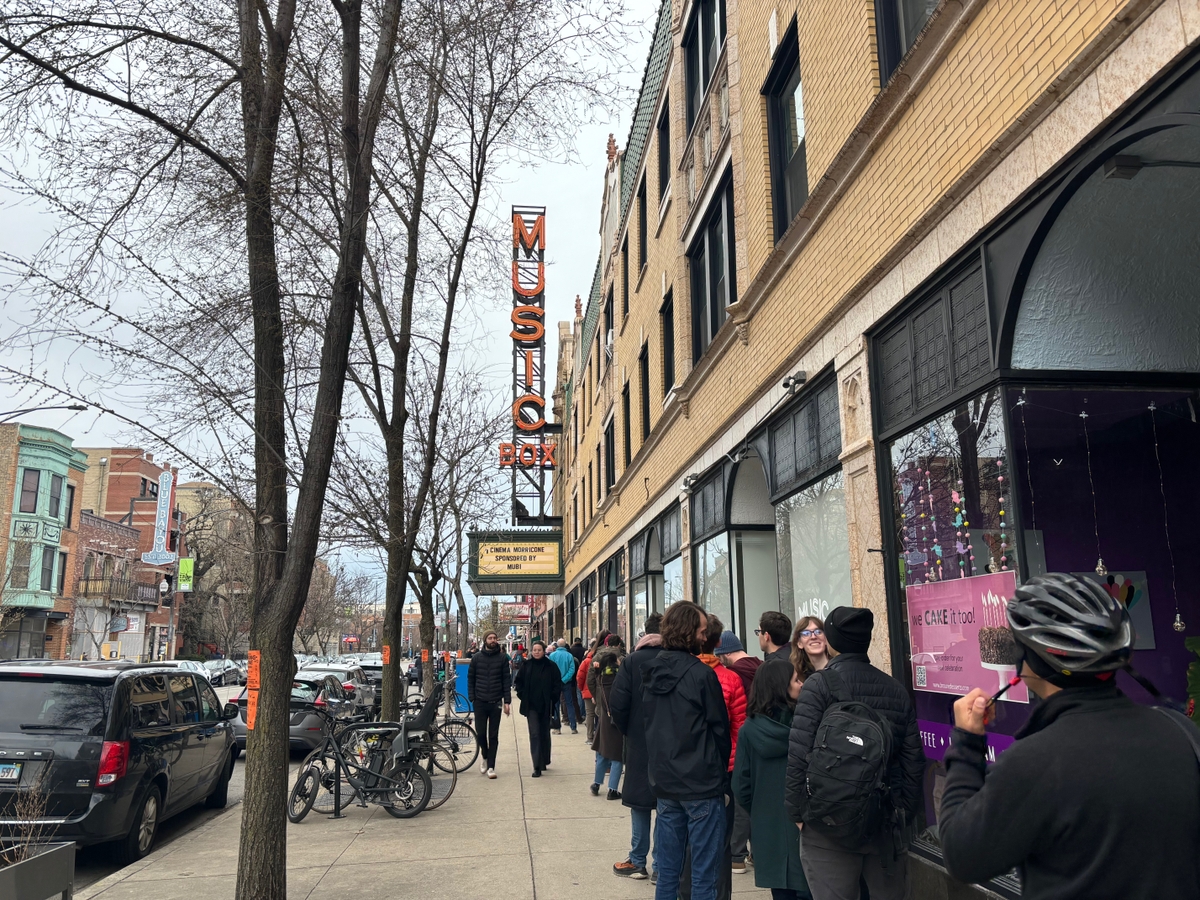Chicago
Keeping It Reel In Chicago
by and | Mar 25, 2024 4:35 pm
Post a Comment | E-mail the Author
Posted to: Film

La battaglia di Algeri
Music Box Theatre
3/24/24
Chicago may not be the first place that aspiring megastars think to showcase their talents on the silver screen, but don’t let anyone deny Chicago’s rich cinematic history. What is cinema without Scarface, The Blues Brothers, Ferris Bueller’s Day Off, Home Alone… Chicago? The city is its own star and its own critic, teeming with movie buffs.
Scattered across the vast plain of Chicagoland are many an independent, underground theater to explore beyond the latest blockbusters. Among the theaters most recognized and prolific in their diverse programming are the Logan Theater, the Davis Theater, and Sweet Void Cinema. The Gene Siskel Film Center screens the best of independent, international, and classic films; Facets Cinematheque, a tiny yet mighty cinema, screens a few films close to Lincoln Park.
On this occasion, we found ourselves at the beloved Music Box Theatre, a charming, one-and-a-half-screen, art deco, ruby-curtained theater in Chicago’s Lakeview neighborhood. It is a nonprofit entity devoted to screening all manner of cinema from Oscar-nominated shorts to Dune Part II in glorious 70mm (truly one has not lived until one has stared down a sandworm the size of an actual bus) to cult classics from The Rocky Horror Picture Show to The Room. Screening real film as much as possible, the Music Box is a testament to the power of communal viewing.

The Music Box interior
This particular week of programming featured “Cinema Morricone,” a festival of screenings in celebration of the music of Ennio Morricone, best known for his inimitable, instantly recognizable work on Sergio Leone’s spaghetti westerns like The Good, the Bad, and the Ugly, Dario Argento’s “giallo” horrors like The Bird with the Crystal Plumage (the Music Box’s showing subsequent to ours) and Giuseppe Tornatore’s Cinema Paradiso, a film credited with reinvigorating Italian cinema and whose director was responsible for the keystone work of Music Box’s Morricone marathon, Ennio: The Maestro. Those being but a few among dozens of other directors with whom Moricone worked intimately and extensively throughout their respective careers.
As our ride share pulled up to the Music Box, we were overwhelmed by the queue; at its end, the marquee was but a blur. Gillo Pontecorvo’s La battaglia di Algeri (1966) retains the canonical attraction that has placed it high upon many lists of cinema’s greatest works.
As skilled house organist Dennis Scott played the 95-year-old theater’s contemporaneous Wurlitzer organ, the audience found seats of choice or fate and settled in with their popcorn and pop. After a brief message from the projectionist — “sit back and have fun, even if this movie isn’t very fun” — the show began.
La battaglia di Algeri (The Battle of Algiers) features the armed struggle between Algerians and their French colonizers in the Algerian War of 1954 – 62, and particularly the famous Battle of Algiers of 1956 – 7, by following Ali la Pointe, a chief agitator for the Front de Liberation Nationale, or FLN, a guerrilla group then dedicated to Algerian liberation. Shot in a clear homage to Roberto Rossellini’s Roma cittá aperta (1945) with its feeling of being more newsreel than what modern viewers would consider cinema, La Battaglia is a visceral, chaotic peek into armed struggle in close urban quarters. It also is a film that depicts the seemingly Sysiphean difficulty of decolonizing a long-occupied area, with French troops resorting to ever worsening torture and interferrence over the course of the film. It bears noting that this film was not permissibly screned in France for half a decade after its release.

Still from The Battle of Algiers.
The historical parallels of the film are striking. Cinematically the film owes a clear debt to Italian neorealism. However, the modern-day corollaries of armed struggle feel far more visceral at the moment, as we see the fear and chaos of urban warfare and its striking lack of change since the setting of this film 67 years ago.
The moral center of Pontecorvo’s film remains the human cost on both sides; it never tries to overmoralize or focus on a “good guy” versus a “bad guy.” Rather, Pontecorvo lingers on soon-to-be victims of bombings by the FLN as much as he focuses on the eyes of to-be-tortured FLN activists. The film’s tension speaks as much to ideological struggle as it does the sheer logistical difficulty and paranoia of revolution. Shots reflect the mood of the people: crowd scenes are short and chaotic, while there is a singularity of shot and purpose as Ali La Pointe moves through the casbah of Algiers. Morricone’s soundtrack earned the film’s place in festival programming: driving percussion and sweeping melodic lines tell their own story of tension, trouble, and struggle in the face of adversity, heightening tension throughout the film.
The film asks the audience to deeply consider conviction and ideals; who and what are you willing to sacrifice for your beliefs? For the French in the film, their desire to stay in Algeria as colonizers is enough to greenlight covert bombings and outright torture; for the Algerians in the FLN, French citizens and fellow FLN comrades alike are collateral in the pursuit of self determination for the people. Algerian citizens are willing to risk danger to hide FLN agitators and, by the end of the film, take to the streets themselves.
To grapple with these questions in a room packed with film lovers, particularly as we watch similar histories unfold in real time, to collectively feel the human cost, to gasp together, is a rare and beautiful privilege in this era of streaming and isolation; Tornatore was onto something in Cinema Paradiso.
Cinema Morricone concludes March 28.